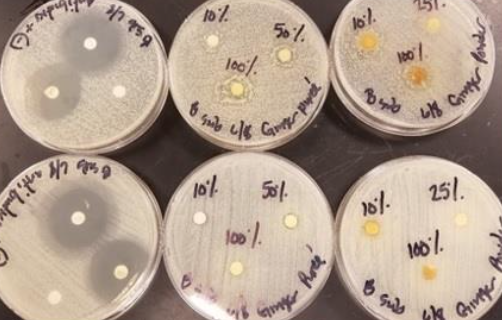Disk Diffusion Tests Show Ginger to be Ineffective as an Antibacterial Agent
(1) Lowell High School, Lowell, Massachusetts, (2) Middlesex Community College, Bedford, Massachusetts
https://doi.org/10.59720/17-040
Before the discovery of antibiotics, alternative medicines were used to treat infectious diseases. Such treatments included ginger, Zingiber officinale, yet investigation into ginger’s effectiveness has produced mixed results. Some studies have shown ginger to be an effective against Escherichia coli, Staphylococcus aureus, and Bacillus subtilis, while other studies have shown it is ineffective. This study continues the exploration of ginger as an antibacterial agent. Ginger powder and ginger root extract were tested to see if inhibition of growth of E. coli, S. aureus, and B. subtilis would occur. Various preparations and concentrations of ginger were tested by disk diffusion tests. Our results revealed that neither ginger preparation had an observable antibacterial effect on growth of E. coli, S. aureus, and B. subtilis at any of the tested concentrations. This is important because many have believed that ginger is an effective antibacterial agent, but according to this study, this does not appear to be the case. These results can guide people to seek treatment with appropriate antibiotics if they have an infection due to E. coli, S. aureus, and/or B. subtilis, as ginger does not appear to inhibit the growth of these organisms. Future studies need to be done to validate these results with other tests, and determine if ginger may enhance the effectiveness of antibiotics.
This article has been tagged with: